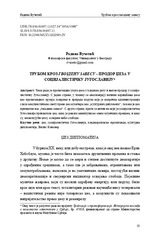Trubom kroz gvozdenu zavesu - prodor džeza u socijalističku Jugoslaviju
Trumpeting through the iron curtain: The breakthrough of jazz in socialist Yugoslavia
| dc.creator | Vučetić, Radina | |
| dc.date.accessioned | 2021-10-12T11:31:51Z | |
| dc.date.available | 2021-10-12T11:31:51Z | |
| dc.date.issued | 2012 | |
| dc.identifier.issn | 1450-9814 | |
| dc.identifier.uri | http://reff.f.bg.ac.rs/handle/123456789/1419 | |
| dc.description.abstract | Tema rada je propagandna uloga džeza u hladnom ratu i njegov prodor u socijalističku Jugoslaviju. S jedne strane, u članku se analiziraju načini korišćenja džeza kao propagandnog oružja Amerike i priroda poruka koje je američka administracija slala komunističkom svetu preko džez muzičara kao 'kulturnih diplomata', te kako je džez prihvatan iza 'gvozdene zavese'. S druge strane, prati se način na koji je socijalistička Jugoslavija prihvatala džez, kako je režim manipulisao ovim muzičkim pravcem, i kako su, zahvaljujući džezu, osvajane veće slobode. | sr |
| dc.description.abstract | During the Cold War, jazz became a powerful propaganda weapon in the battle for ‘hearts and minds’. As early as the 1950s, the American administration began its Cold War ‘jazz campaign’, by broadcasting the popular jazz radio show Music USA over the Voice of America, and by sending its top jazz artists on world tours. In this specific cultural Cold War, Yugoslavia was, as in its overall politics, in a specific position between the East and the West. The postwar period in Yugoslavia, following the establishment of the new (socialist) government, was characterized by strong resistance towards jazz as ’decadent’ music, until 1948 when ‘no’ to Stalin became ‘yes’ to jazz. From the 1950s, jazz entered Yugoslav institutions and media, and during the following two decades, completely conquered the radio, TV, and record industry, as well as the manifestations such as the Youth Day. On account of the openness of the regime during the 1950s and 1960s, Yugoslavia was frequently visited by the greatest jazz stars, such as Dizzy Gillespie, Louis Armstrong and Ella Fitzgerald. In the context of the Cold War, the promotion of jazz in Yugoslavia proved to be beneficial for both sides - by exporting jazz, America also exported its freedom, culture and system of values, while Yugoslavia showed the West to what extent its political system was open and liberal, at least concerning this type of music. | en |
| dc.publisher | Srpska akademija nauka i umetnosti SANU - Muzikološki institut, Beograd | |
| dc.relation | info:eu-repo/grantAgreement/MESTD/Integrated and Interdisciplinary Research (IIR or III)/47019/RS// | |
| dc.rights | openAccess | |
| dc.rights.uri | https://creativecommons.org/licenses/by-nc-nd/4.0/ | |
| dc.source | Muzikologija | |
| dc.subject | Vilis Konover | sr |
| dc.subject | socijalistička Jugoslavija | sr |
| dc.subject | kulturna diplomatija | sr |
| dc.subject | hladnoratovska propaganda | sr |
| dc.subject | džez | sr |
| dc.title | Trubom kroz gvozdenu zavesu - prodor džeza u socijalističku Jugoslaviju | sr |
| dc.title | Trumpeting through the iron curtain: The breakthrough of jazz in socialist Yugoslavia | en |
| dc.type | article | |
| dc.rights.license | BY-NC-ND | |
| dc.citation.epage | 77 | |
| dc.citation.issue | 13 | |
| dc.citation.other | (13): 53-77 | |
| dc.citation.rank | M24 | |
| dc.citation.spage | 53 | |
| dc.identifier.fulltext | http://reff.f.bg.ac.rs/bitstream/id/370/1416.pdf | |
| dc.identifier.rcub | https://hdl.handle.net/21.15107/rcub_reff_1419 | |
| dc.type.version | publishedVersion |

